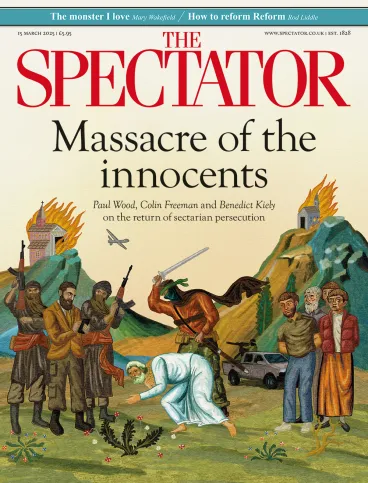
Punk rock, packaged, parcelled, and boxed up as a treat for nostalgic wrinklies. That’s the deal with Punk Off!, a touring show that recently completed a lap of the country at the Dominion Theatre. Most of the audience were there to recall their rebellious heyday. ‘It’s about to get really, really loud,’ announced the compère, Kevin Kennedy, as the four-piece band hammered out ‘Sheena Is A Punk Rocker’ ‘and ‘If the Kids Are United’. Both hits sounded eerily unfamiliar. Why? Those raucous, pulsing rhythms can’t be turned into elevator jingles or a background drone at a shopping mall – so we rarely hear them. Just as well.
Kennedy rattled through the major turning points in the movement’s history. In 1974 Malcolm McLaren and Vivienne Westwood opened their anti-fashion shop, Sex, on the King’s Road. On 4 June 1976, the Sex Pistols played at the Free Trade Hall, Manchester, ‘to a crowd of just 40’, said Kennedy, ‘and not the 4,000 who later claimed to have been there’. The audience included Morrissey, Tony Wilson, Ian Curtis of New Order and Pete Shelley, who founded Buzzcocks. On 1 December 1976, punk became a national sensation after Johnny Rotten and Steve Jones used foul language on a live news show hosted by Bill Grundy for Thames TV (not for the BBC, as Kennedy claimed).
The history lesson was punctuated by a medley of hits from the leather-clad band accompanied by four prancing chorus girls. The musicians were fine. The dancers relied on over-rehearsed moves and they wore a selection of chic and attractive Westwood-esque costumes. That looked wrong. Punk fashions were revolting, ugly and improvised. The fans sliced up their garments with razor blades and thrust safety pins through their gashed earlobes as an act of deliberate provocation. At times, this show resembled the dead-safe, squeaky-clean pop culture that the punk movement vowed to annihilate.
Most of the crowd listened quietly in their seats throughout. A few old dears stood up during ‘White Riot’ by Sham 69 and tossed their grey curls around. ‘Teenage Kicks’ by the Undertones inspired a chubby rebel to heave himself into a vertical position and punch the air with his anaemic fists. Gravity soon brought him back down to earth. By the end of the first half, many were ready for a catnap. During the interval, which was wisely extended to 25 minutes, an obedient queue of oldies collected tap water for their heart pills.
This show resembled the dead-safe, squeaky-clean pop culture that the punk movement vowed to annihilate
The second half ushered in a softer, friendlier, cheesier musical energy. The furious spirit of punk couldn’t last for more than a couple of years and after burning itself out it made way for ‘the new wave’, as it was known, with its seductive, cleverly worked tunes composed by profiteers posing as rebels. Chief among the con artists was Debbie Harry – two cheekbones and a bottle of peroxide – who attracted the loathing of all genuine punk fans. How could she be a youthful upstart? In 1978, she was 33. An old lady.
Among the tribute acts, one band stood out as inimitable. The Sex Pistols occupy a plane of creative fury that no simulator can hope to reach. The unfortunate actor playing Johnny Rotten wore a silvery belt-chain and a scarlet beret plonked on his skull, as if he were Freddie Starr impersonating Mick Jagger. Even his attempts to seem uncontrollably furious looked calculated. As the copy-cat Pistols capered through their routines, all you could see were lapses, false moves, empty gestures and unbridgeable chasms between the replica and the original. That’s not a criticism, just an inevitability.
Dear Martin is a new comedy drama about a jailed psychopath who wants an easier life in an open prison. Martin has to convince his psychiatrist that he’s a sociable human being, and he gets a lucky break. A lonely housewife starts writing him letters and Martin’s replies reach her drippy husband, Dave. Martin invites Dave to the prison and they become friends.
Dave’s marriage is in trouble and Martin offers him comically foolish advice. He suggests that Dave should cheat on his wife in order to make her jealous, needy and more attentive. That’s exactly how a psycho would think. The plan backfires and Dave finds himself excluded from the family home. ‘I had to sing happy birthday through the letterbox last week.’
Meanwhile Martin gets to work on his psychiatrist, played brilliantly by Amelia Donkor, who has to endure a barrage of hurtful and unwarranted comments about her looks. That doesn’t quite ring true. A manipulative crook like Martin would try to flatter an attractive female doctor who holds the key to his future.
The show is ably directed by Wiebke Green who uses a scrubbed white set to represent the madhouse. The suave and charismatic Alex Mugnaioni, who plays Martin, is clearly an actor to watch.









Comments